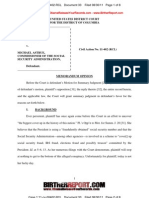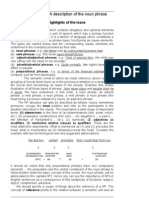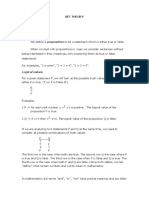Class 1 Noun Phrase Writing Cae Texts
Class 1 Noun Phrase Writing Cae Texts
Uploaded by
Elizabeth CeballosCopyright:
Available Formats
Class 1 Noun Phrase Writing Cae Texts
Class 1 Noun Phrase Writing Cae Texts
Uploaded by
Elizabeth CeballosOriginal Description:
Copyright
Available Formats
Share this document
Did you find this document useful?
Is this content inappropriate?
Copyright:
Available Formats
Class 1 Noun Phrase Writing Cae Texts
Class 1 Noun Phrase Writing Cae Texts
Uploaded by
Elizabeth CeballosCopyright:
Available Formats
Class1_noun phrase and CAE writing 23-08-2017
RW2Cchaparro
Remembering the noun phrase
The 5 grammatical functions of a noun
A noun can be defined as a word that is used to name a person, place, animal, or thing. It can
also name a state, an activity, an action, or a quality.
What is the grammatical function of a noun?
The work that a noun performs in a sentence is referred to as its grammatical function. In this
article, we are going to take a detailed look at the five grammatical functions of nouns.
A noun can perform any of the following five functions:
Subject of a verb
Object of a verb
Complement of a verb
Object of a preposition
Be in apposition to another noun
Let us now take a look at the functions above one by one.
Noun functioning as the subject of a verb
A noun will function as the subject of a verb when it is the subject of the sentence and comes
before the main verb of the sentence. More often than not, the noun will begin the sentence.
Example: Stacy killed a snake last night. (Here, the noun Stacy is functioning as the subject
of the verb killed.)
Other examples are as follow:
John teaches English in China.
Children can be very naughty sometimes.
Obama was voted President.
The politician is a liar.
All of the highlighted nouns in the sentences above are functioning as subjects to their
respective verbs. They function as subjects of verbs simply because they come before the
main verbs in the sentences and are also the subjects in their respective sentences.
Noun functioning as an object of a verb
A noun functions as an object of a verb when it comes after an action verb and receives the
action of the verb. A noun functioning as an object of a verb in a sentence will always be the
recipient of an action.
Example: Tom slapped Jerry. (Here, since the noun Jerry is coming after the action verb
slapped and receiving the action of the verb, we say it is the object of the verb slapped.)
More examples:
I kicked the ball.
I hate Janet.
The teacher punished the students.
I wrote the letter.
I know London because I have been there several times.
Roberta cooked the food.
All of the highlighted words in the sentences above are nouns functioning as objects of verbs.
They are functioning as objects of their respective verbs simply because they are the recipients
of the actions of their verbs.
Noun functioning as the complement of a verb
A noun will function as the complement of a verb when it comes after a linking verb or a state-
of-being verb and receives no action from the verb. Some examples of linking verbs in the
English language include the following: is, are, am, be, are, was, were, been, being, seem,
taste, appoint, become, feel, smell, sound, appear, etc.
Example: John is a liar. (Here, the noun liar is functioning as the complement of the verb
is.)
Other examples of nouns functioning as complements of verbs:
The man is a trader.
I was a teacher while living in China.
John is the winner.
Our friends from Pakistan were the losers.
I think it is an animal.
Phil Collins is a legendary musician.
All highlighted nouns in the sentences above are functioning as complements of their
respective linking verbs.
Noun functioning as the object of a preposition
When a noun functions as the object of a preposition, it comes after a preposition in a
sentence. By definition, any noun that comes immediately after a preposition is the object of
that preposition. For example John is the object of the preposition to in this sentence: I gave
the book to John.
We can therefore say that the noun John is functioning as the object of the preposition to.
Now that we have a good understanding as to what a noun functioning as the object of a
preposition looks like, let us take a look at some more examples below.
I interceded for the boy.
I will buy books for the children today when I visit the bookstore.
I have to give it to the teacher.
Let us go with John.
I trust in God.
It is not mine; it is for the landlord.
From the examples above, you can see that each of the nouns highlighted come after
prepositions thereby making them objects of their respective prepositions.
Noun being in apposition to another noun
This is the last but not least grammatical function of a noun. A noun can be in apposition to
another noun. By definition, the word apposition means putting a noun next to another noun
to explain it. So each time you see a noun placed next to another noun and that noun is
explaining the other noun, then you have a good example of a noun being in apposition to
anther noun.
For example: The footballer, Suarez has been suspended. (Here, you notice that two nouns
have been put next to each other, namely footballer and Suarez. Now, you notice that the
noun Suarez can be used to replace footballer and it also gives some information about the
other noun "footballer". So we can say the noun "Suarez" is in apposition to the noun
"footballer")
Other examples include the following:
The nurse, Janet has retired.
His book, Animal Farm, is considered one of the greatest books ever written.
The pastor, Elijah, has been arrested.
My hometown, Manchester, is a wonderful place.
All the highlighted nouns in the sentences above are nouns being in apposition to the nouns
coming before them.
Parts of the noun phrase
determiners, such as the, a, this, my, some, Jane's
attributive adjectives, such as large, beautiful, sweeter
adjective phrases and participial phrases, such as extremely large, hard as nails, made of
wood, sitting on the step
noun adjuncts, such as college in the noun phrase a college student
nouns in certain oblique cases, in languages which have them, such as German des
Mannes ("of the man"; genitive form)
prepositional phrases, such as in the drawing room, of his aunt
adnominal adverbs and adverbials, such as (over) there in the noun phrase the man (over)
there
relative clauses, such as which we noticed
other clauses serving as complements to the noun, such as that God exists in the noun
phrase the belief that God exists
infinitive phrases, such as to sing well and to beat in the noun phrases a desire to sing
well and the man to beat
Text Structural Features Language features
Type
Article / Title (article + Has to catch and hold readers attention so needs
Contribu contribution) interesting opening and effective ending.
tion Paragraph headings Use direct questions.
(contribution) Try to personalize it.
Register depends on target reader but usually informal
neutral.
Competi Title Has to stand out from other pieces on the specified topic so
tion needs a striking opening and memorable ending.
Entry Register depends on target reader but usually informal
neutral.
Report Title Clear introduction explaining the reason for the report
Paragraph headings Very clear language describing something precisely
Objective / impersonal style.
Neutral to formal register depending on target reader.
Clear conclusion, usually a recommendation.
Proposal Title Clear introduction explaining reason for writing.
Paragraph headings Very clear language, persuasive language, recommendations
/ suggestions.
Objective / impersonal style.
Neutral to formal register depending on target reader.
Argument backed up by crystal clear reasons.
Essay Title usually provided. Neutral formal register
Academic piece of writing
Examine both sides of an argument in a clearly organized
structure.
Likely to come to a definite conclusion.
Informat Title Neutral formal register
ion Paragraph headings Clear language explaining rules and regulations for example.
Sheet Distinct paragraphs about different subjects, no links
between paragraphs.
Review Title Early statement of the subject of the review (film, book,
website etc.)
Some factual information about the subject.
More of the content should be devoted to the writers
opinions on the subject.
Writers opinion supported by examples related to subject.
Formal Opening and closing Clear opening paragraph giving reason for writing.
Letter conventions: Language that persuades by giving reasons supported by
Dear sir / madam to examples.
whom it may concern-
yours faithfully
Dear Mr. Smith yours
sincerely
You might also like
- Building Skills For Proficiency by Cesur ÖztürkDocument784 pagesBuilding Skills For Proficiency by Cesur Öztürksamet84% (31)
- Racist Emails Sent by Texas Windstorm Insurance AssociationDocument89 pagesRacist Emails Sent by Texas Windstorm Insurance AssociationTexas Public RadioNo ratings yet
- Christmas Jeopardy Games - 112655Document32 pagesChristmas Jeopardy Games - 112655RRKATANo ratings yet
- Sample Auto Declarations SampleDocument2 pagesSample Auto Declarations SampleErika Fatz SandersNo ratings yet
- 2013 IUOE International RICO FilingDocument526 pages2013 IUOE International RICO Filing501maninblack15No ratings yet
- Expanding Your VocabDocument2 pagesExpanding Your VocabHamed Daei Kasmaei100% (1)
- Final Lara Luis ComplaintDocument87 pagesFinal Lara Luis Complainteds623No ratings yet
- Fein Such & Crane LLP, Foreclosure Fraud, IndyMac Decided Oct 4 2012Document19 pagesFein Such & Crane LLP, Foreclosure Fraud, IndyMac Decided Oct 4 2012KingGeorgeIX100% (1)
- Cash CallDocument16 pagesCash CallForeclosure Fraud100% (1)
- Participle PhrasesDocument12 pagesParticiple PhrasesMay LoNo ratings yet
- Interesting FactsDocument2 pagesInteresting FactsKathy Abe100% (1)
- Development of Communication Field & Skill 2Document55 pagesDevelopment of Communication Field & Skill 2hersinta100% (1)
- Dialogue How To Punctuate, Use Tags, and Vary The Structure of Your DialogueDocument13 pagesDialogue How To Punctuate, Use Tags, and Vary The Structure of Your DialogueThaddeusVandermanNo ratings yet
- JLS Will Questionnaire Version 4.0Document10 pagesJLS Will Questionnaire Version 4.0Benn KingyNo ratings yet
- Studying For ToeflDocument41 pagesStudying For ToeflFernanda Fuentes100% (1)
- Complete KYTC Standard Specifications - 2004Document618 pagesComplete KYTC Standard Specifications - 2004MuhammadIqbalMughalNo ratings yet
- Reversed On Some Counts and Remanded-Wigood V Wells Fargo - Hamp Loan Mod Denied To Homeowner-Seventh Circuit Court of Appeals OpinionDocument235 pagesReversed On Some Counts and Remanded-Wigood V Wells Fargo - Hamp Loan Mod Denied To Homeowner-Seventh Circuit Court of Appeals Opinion83jjmack100% (1)
- @ at @ The Topic of The Programme Is Not All About The Presenter. TheDocument10 pages@ at @ The Topic of The Programme Is Not All About The Presenter. TheMd Shaheenul IslamNo ratings yet
- Cultural Variation in Nonverbal Communication: Business EffectsDocument8 pagesCultural Variation in Nonverbal Communication: Business EffectsAbul HasnatNo ratings yet
- 100 Songs For Kids Cd1 - LyricsDocument12 pages100 Songs For Kids Cd1 - LyricsYani SimbolonNo ratings yet
- Informative Speech ELC590Document2 pagesInformative Speech ELC590Badrudin Jundaili100% (1)
- Mon Vowels CharactersDocument3 pagesMon Vowels CharactersDho Ong Jhaan100% (1)
- CLAUSE Adverb Clause JSLDocument13 pagesCLAUSE Adverb Clause JSLoperation teknoNo ratings yet
- Taitz V Astrue USDC DC Memorandum OPINION Signed by Chief Judge Royce C LamberthDocument8 pagesTaitz V Astrue USDC DC Memorandum OPINION Signed by Chief Judge Royce C LamberthObamaRelease YourRecordsNo ratings yet
- 5 Advanced Interview TechniqueDocument123 pages5 Advanced Interview TechniqueAlnisa RisatiNo ratings yet
- Capital Letters, PunctuationDocument13 pagesCapital Letters, PunctuationJan Piero100% (1)
- 196 - Joint Proposed PTODocument72 pages196 - Joint Proposed PTOSarah BursteinNo ratings yet
- Bluebook Abbreviations of Law Reviews & Legal Periodicals Indexed in CILPDocument20 pagesBluebook Abbreviations of Law Reviews & Legal Periodicals Indexed in CILPRicharnellia-RichieRichBattiest-CollinsNo ratings yet
- Argument Writing TemplateDocument3 pagesArgument Writing TemplateSiti IlyanaNo ratings yet
- EBC M3-2019-2020.pdf - 22619 - 1 - 1580470948000Document6 pagesEBC M3-2019-2020.pdf - 22619 - 1 - 1580470948000Anita AntalNo ratings yet
- Lps Suits Et AlDocument12 pagesLps Suits Et Alsoul2journeyNo ratings yet
- Swan - Chapter 5Document3 pagesSwan - Chapter 5Sam DAvisNo ratings yet
- Active VsDocument6 pagesActive Vsaisfadhila17No ratings yet
- Basic English 2Document9 pagesBasic English 2hassanNo ratings yet
- Sem 2 BBA-Bcom - Class Notes 2Document14 pagesSem 2 BBA-Bcom - Class Notes 2Anil Shenoy KNo ratings yet
- Active and Passive VoiceDocument4 pagesActive and Passive VoiceSelene Gonzalez CastilloNo ratings yet
- CSEET Business Communication May 2022 Revision NotesDocument42 pagesCSEET Business Communication May 2022 Revision NotesSAHAJPREET BHUSARINo ratings yet
- Formal & Functional LabelsDocument21 pagesFormal & Functional LabelsHarvinPopat100% (2)
- Active VsDocument10 pagesActive VsZwe Htut NaingNo ratings yet
- 1.1 Background of The PaperDocument8 pages1.1 Background of The PaperFACHRIANI -2020-BLOK 3No ratings yet
- 1-Lesson 1 Syntax 2021Document5 pages1-Lesson 1 Syntax 2021AYOUB ESSALHINo ratings yet
- Definition of Essay: Name: Rahayu Silaban NIM: 170502004 Course: English Departmen: Lamma Sihotang, SPD, MPDDocument2 pagesDefinition of Essay: Name: Rahayu Silaban NIM: 170502004 Course: English Departmen: Lamma Sihotang, SPD, MPDRahayu SilabanNo ratings yet
- ENG509 FINAL PREP 2020 BY PARAGON - S.PDF Version 1Document27 pagesENG509 FINAL PREP 2020 BY PARAGON - S.PDF Version 1XahidNo ratings yet
- Modul Bahasa Inggris OLNASDocument25 pagesModul Bahasa Inggris OLNASRizki SalamiNo ratings yet
- Makalah B. InggrisDocument13 pagesMakalah B. InggrisJaya SandraNo ratings yet
- Theme 6. Adjective: Degrees of ComparisonDocument5 pagesTheme 6. Adjective: Degrees of ComparisonAlla KulynychNo ratings yet
- FTU-SEM-03-Midterm-Nguyen Thi Thu PhuongDocument3 pagesFTU-SEM-03-Midterm-Nguyen Thi Thu PhuongNguyễn Thị Thu Phương50% (2)
- Parts of SpeechDocument18 pagesParts of SpeechSakunthala RajeshNo ratings yet
- Sentence Structure and Types of Sentences - Grammar - Academic Guides at Walden UniversityDocument1 pageSentence Structure and Types of Sentences - Grammar - Academic Guides at Walden Universityphia mrtnNo ratings yet
- Group 3-Unit 3-Class - Wed - 345Document4 pagesGroup 3-Unit 3-Class - Wed - 345Cao Trâm AnhNo ratings yet
- Mid Term Review LNG 181Document21 pagesMid Term Review LNG 181Jem Marielle Rosanne RiveraNo ratings yet
- Analysis of What's in A NameDocument2 pagesAnalysis of What's in A NameJonathon SeetoNo ratings yet
- Lesson Note On English Language Jss1 First TermDocument63 pagesLesson Note On English Language Jss1 First TermmaudofunmilayoNo ratings yet
- Syntactic CategoryDocument19 pagesSyntactic CategoryPinkyFarooqiBarfiNo ratings yet
- EnglishDocument24 pagesEnglishAbdallah KabalanNo ratings yet
- Lesson 8. Lexical Categories Introduction DiscussionDocument6 pagesLesson 8. Lexical Categories Introduction DiscussionColleen CastueraNo ratings yet
- Lecture 3Document16 pagesLecture 3kundyz083No ratings yet
- Linguistics I: Form and FunctionDocument10 pagesLinguistics I: Form and FunctionLorenzo Vaez100% (1)
- Parts of SpeechDocument19 pagesParts of Speechzafar iqbalNo ratings yet
- LEC - Noun Phrase, An I, Sem. 1 IDDocument40 pagesLEC - Noun Phrase, An I, Sem. 1 IDlucy_ana1308No ratings yet
- 12-13 Study Guide Christmas CarolDocument2 pages12-13 Study Guide Christmas Carolapi-241107778No ratings yet
- Final RevisionDocument38 pagesFinal RevisionJoey DingNo ratings yet
- Grammar IIIDocument89 pagesGrammar IIIyaninaNo ratings yet
- Presentation Chapter 7 Theta RolesDocument64 pagesPresentation Chapter 7 Theta RolesmemskhawlaNo ratings yet
- Purposes and Structures Ofsarcasm: A Pragmatic Study: Multicultural EducationDocument9 pagesPurposes and Structures Ofsarcasm: A Pragmatic Study: Multicultural EducationRofifah SholihahNo ratings yet
- Unit 7 - The Structure of Noun PhrasesDocument58 pagesUnit 7 - The Structure of Noun PhrasesMeiNo ratings yet
- Sesions #1 - English IiDocument9 pagesSesions #1 - English IiPaola Joelyn FgNo ratings yet
- Grade 2 q2 English Module 3Document6 pagesGrade 2 q2 English Module 3SheChanNo ratings yet
- 0000 Mandarin Corner HSK MergeDocument881 pages0000 Mandarin Corner HSK MergevandersteenNo ratings yet
- Degrees - of .ComparisonDocument27 pagesDegrees - of .ComparisonJanelyvie AgustinNo ratings yet
- Problems in CommunicationDocument2 pagesProblems in CommunicationMuhammad Mussawar100% (1)
- PrepositionDocument40 pagesPrepositionDiwa TamaNo ratings yet
- Comparative: Unit 8Document2 pagesComparative: Unit 8Fadhel M. Al-GhifaariNo ratings yet
- Pronoun Antecedent AgreementDocument28 pagesPronoun Antecedent AgreementExcel Joy MarticioNo ratings yet
- Orca Share Media1543287167962Document22 pagesOrca Share Media1543287167962ROS PHILIPPINESNo ratings yet
- Catherine Belsey AssignmentsDocument2 pagesCatherine Belsey AssignmentsMuhammad Mussawar67% (6)
- Parts of Speech TestDocument4 pagesParts of Speech TestJames BurtonNo ratings yet
- Pengertian Dan Contoh Kalimat Verb Phrase - Materi Bahasa Inggris PDFDocument4 pagesPengertian Dan Contoh Kalimat Verb Phrase - Materi Bahasa Inggris PDFGlorio FalloNo ratings yet
- Determiners &articlesDocument9 pagesDeterminers &articlesAaditya SinghNo ratings yet
- French Grammar AdjectivesDocument25 pagesFrench Grammar AdjectivesKrishna RoyNo ratings yet
- 6 Adjectives, Comparatives and SuperlativesDocument3 pages6 Adjectives, Comparatives and SuperlativesXAANNo ratings yet
- NLP01 IntroNLPDocument68 pagesNLP01 IntroNLPThakur Sahil NarayanNo ratings yet
- Phrasal VerbsDocument3 pagesPhrasal Verbsvishnu 2010No ratings yet
- Adjective Adverb Prepositional PhrasesDocument10 pagesAdjective Adverb Prepositional PhrasesUser BlobNo ratings yet
- The Game of Language Studies in Game-Theoretical Semantics and Its Applications (Jaakko Hintikka (Auth.) ) (Z-Library)Document349 pagesThe Game of Language Studies in Game-Theoretical Semantics and Its Applications (Jaakko Hintikka (Auth.) ) (Z-Library)Luiz BadeNo ratings yet
- Practical Grammar of Modern Chinese I Overview and Notional Words (Liu Yuehua, Pan Wenyu, Gu Wei) (Z-Library)Document317 pagesPractical Grammar of Modern Chinese I Overview and Notional Words (Liu Yuehua, Pan Wenyu, Gu Wei) (Z-Library)quinnyen269No ratings yet
- Learning Activity 3 / Actividad de Aprendizaje 3 Evidence: Your Next Holiday Destination / Evidencia: Su Próximo Destino de VacacionesDocument11 pagesLearning Activity 3 / Actividad de Aprendizaje 3 Evidence: Your Next Holiday Destination / Evidencia: Su Próximo Destino de VacacionesJENNY LUCELLY SUAREZ MURCIANo ratings yet
- Fable 1 AlwyDocument2 pagesFable 1 AlwyAfkarullahhNo ratings yet
- Grammer Class 8 Progress PublishersDocument28 pagesGrammer Class 8 Progress PublishersE.AlagunathanNo ratings yet
- Spoken EnglishDocument168 pagesSpoken EnglishVinoth KannanNo ratings yet

























































































